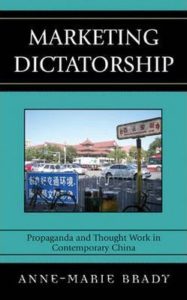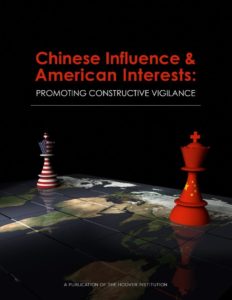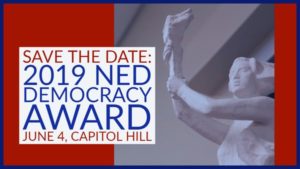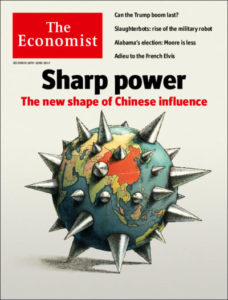Xi Jinping’s sharp power offensive is a strategic threat to the integrity of liberal democracy, says a leading expert.
“The Xi government’s go-global, multi-platform, international strategic communication strategy aims to control international perceptions about China and the policies of the CCP government,” notes Anne-Marie Brady, a specialist in the Chinese Communist Party’s (CCP) Party-State system and author of Marketing Dictatorship. “All forms of mass communication are utilised, from films and advertising, to new media and academic and non-academic publications.”
 All parties need to work to protect the integrity of the political system and to address the issue of the CCP’s interference. The way forward, she told a Parliamentary Select Committee Inquiry into Foreign Interference, is to jointly:
All parties need to work to protect the integrity of the political system and to address the issue of the CCP’s interference. The way forward, she told a Parliamentary Select Committee Inquiry into Foreign Interference, is to jointly:
1. Establish a non-partisan resilience strategy.
2. Exchange information and seek support from other like-minded states and sister political parties.
3. Focus on common points with China, while facing up to the differences and challenges in the wider relationship.
U.S.competition with China “is different as an adversarial dyad than in the 20th century with the Soviet Union in the sense that … when we think about the Soviet Union and that competition, in a way it was a fight within the Western family,” said State Department Director of Policy Planning Dr. Kiron Skinner (above):,
This is a fight with a really different civilization and a different ideology, and the United States hasn’t had that before. Nor has it had an economic competitor the way that we have. The Soviet Union was a country with nuclear weapons, a huge Red Army, but a backwards economy. … In China we have an economic competitor, we have an ideological competitor, one that really does seek a kind of global reach that many of us didn’t expect a couple of decades ago.
But her comments were also part of her broader, and deeply problematic, argument that China exists outside of the Western philosophical tradition, and therefore old strategies of foreign policy statecraft — like promoting human rights — will not be effective, notes Abraham M. Denmark, director of the Asia Program and a senior fellow at the Kissinger Institute on China and the United States at the Woodrow Wilson International Center for Scholars. This argument is poorly considered for several reasons, he writes for War on The Rocks:
 First, China does not exist entirely outside the Western philosophical tradition. The Chinese Communist Party itself is founded on the philosophies of Karl Marx (who Skinner described as part of the Western tradition) and Vladimir Lenin. But these thinkers are not exactly alien to the Chinese Communist Party. Marxism-Leninism is enshrined in the Chinese Constitution, and Chinese President Xi Jinping has recently emphasized Marx as the “greatest thinker of modern times” in his effort to revitalize China’s commitment to the communist ideology. ….
First, China does not exist entirely outside the Western philosophical tradition. The Chinese Communist Party itself is founded on the philosophies of Karl Marx (who Skinner described as part of the Western tradition) and Vladimir Lenin. But these thinkers are not exactly alien to the Chinese Communist Party. Marxism-Leninism is enshrined in the Chinese Constitution, and Chinese President Xi Jinping has recently emphasized Marx as the “greatest thinker of modern times” in his effort to revitalize China’s commitment to the communist ideology. ….- Second, the idea that Russia is “part of the Western family” is not a terribly useful construction. It is inconsistent with some U.S. theories that were popular during the early decades of the Cold War as well as with the theories of Samuel Huntington that were discussed at this event. Daniel Nexon highlighted that many Americans during the Cold War saw Russia as outside of Western civilization, and Paul Musgrave pointed out that Huntington similarly identified Russia as part of the “Orthodox” civilization that is different from the West….
 Finally, the argument that China’s status as somehow outside of the Western philosophical tradition renders it immune to appeals to human rights is demonstrably inaccurate. In fact, China has a robust history of appeals to democracy and human rights, including Sun Yat-sen’s “Three Principles of the People” in 1911, the subsequent New Culture Movement that began in 1915, the pro-democracy protests of 1989, 2008’s “Charter 08” movement, and most recently the 2014 Hong Kong Umbrella movement.
Finally, the argument that China’s status as somehow outside of the Western philosophical tradition renders it immune to appeals to human rights is demonstrably inaccurate. In fact, China has a robust history of appeals to democracy and human rights, including Sun Yat-sen’s “Three Principles of the People” in 1911, the subsequent New Culture Movement that began in 1915, the pro-democracy protests of 1989, 2008’s “Charter 08” movement, and most recently the 2014 Hong Kong Umbrella movement.
“More problematically, Skinner’s arguments seemed to align with those of the Chinese Communist Party: that so-called “Western” ideals of human rights are not appropriate for Chinese culture, and that U.S. efforts to promote these values are veiled strategies to undermine the Chinese Communist Party’s rule, Denmark writes.
 There are few departures from the “never criticize China” rule adopted by American popular-culture outlets, notes MICHAEL AUSLIN, the Payson J. Treat Fellow in Contemporary Asia at the Hoover Institution, Stanford University. @michaelauslin. One significant example is the Amazon Prime Los Angeles–based crime drama Bosch, starring Titus Welliver and based on the novels by Michael Connelly, he writes for National Review:
There are few departures from the “never criticize China” rule adopted by American popular-culture outlets, notes MICHAEL AUSLIN, the Payson J. Treat Fellow in Contemporary Asia at the Hoover Institution, Stanford University. @michaelauslin. One significant example is the Amazon Prime Los Angeles–based crime drama Bosch, starring Titus Welliver and based on the novels by Michael Connelly, he writes for National Review:
Bosch included a major China subplot in its fourth season last year, and nods to China in the fifth season. Suffused with a Raymond Chandler–like sensibility, Bosch is television noir, stripping away the pieties of a superficial society that covers up its dark underbelly by common consent so as not to offend the sensibilities of those refined enough to escape its sordid reality.
Dollar Diplomacy or Debt Trap? Examining China’s Role in the Western Hemisphere: Subcommittee on Western Hemisphere, Civilian Security and Trade (Committee on Foreign Affairs)
2172 RHOB, Capitol Hill, Washington, D.C. Thursday, May 9, 2019 (10:00 AM)
Witnesses:
Ms. Margaret Myers, Program Director, Asia & Latin America Program, Inter-American Dialogue. Witness Biography [PDF]
Mr. Brian Fonseca, Director, Jack D. Gordon Institute for Public Policy, Florida International University. Witness Biography [PDF]
 Mr. Christopher Walker, Vice President for Studies and Analysis, National Endowment for Democracy. Witness Biography [PDF]
Mr. Christopher Walker, Vice President for Studies and Analysis, National Endowment for Democracy. Witness Biography [PDF]
China’s Influence in Europe/Eurasia: House Foreign Affairs — Subcommittee on Europe, Eurasia, Energy, and Environment. Subcommittee Hearing, 2167 Rayburn Bldg, Thursday May 9
Europe, Eurasia, Energy and the Environment Subcommittee (Chairman William Keating, D-Mass.) of House Foreign Affairs Committee hearing on “China’s Expanding Influence in Europe and Eurasia.”
- Philippe Le Corre, nonresident senior fellow at the Carnegie Endowment for International Peace’s Europe and Asia Programs and former special assistant for international affairs to the French defense minister;
- Stephanie Segal, deputy director, senior fellow and political economy chair at the Center for Strategic and International Studies and former co-director of the Treasury Department’s East Asia Office;
- Andrea Kendall-Taylor, senior fellow and director of the Center for a New American Security’s Transatlantic Security Program and former deputy national intelligence officer for Russia and Eurasia in the Office of the Director of National Intelligence;
- Zack Cooper, research fellow at the American Enterprise Institute and former assistant to the deputy national security adviser for combating terrorism.
Chinese/Russian Influence in Mideast
House Foreign Affairs — Subcommittee on Middle East, North Africa, and International Terrorism: Subcommittee Hearing.
Middle East, North Africa and International Terrorism Subcommittee (Chairman Ted Deutch, D-Fla.) of House Foreign Affairs Committee hearing on “Chinese and Russian Influence in the Middle East.”
- Former Deputy Assistant Defense Secretary for Middle East Policy Andrew Exum, executive at Hakluyt and Company;
- Former Defense Undersecretary for Policy Christine Wormuth, senior fellow and director of the RAND Corporation International Security and Defense Policy Center;
- Jon B. Alterman, senior vice president, global security and geostrategy chair and director of the Center for Strategic and International Studies Middle East Program;
- Anna Borshchevskaya, senior fellow at the Washington Institute for Near East Policy.
Thursday, May 9, 1:30 p.m. 2172 Rayburn Bldg., Capitol Hill, Washington, DC.
China’s Influence in Asia/United States: House Foreign Affairs — Subcommittee on Asia, the Pacific, and Nonproliferation. Subcommittee Hearing
Asia, the Pacific and Nonproliferation Subcommittee (Chairman Brad Sherman, D-Calif.) of House Foreign Affairs Committee hearing on “China’s Growing Influence in Asia and the United States.”
Wednesday, May 8, 2:00 p.m. 2200 Rayburn Bldg., Capitol Hill, Washington, DC.







